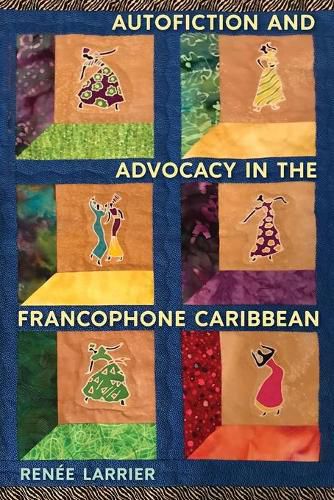Readings Newsletter
Become a Readings Member to make your shopping experience even easier.
Sign in or sign up for free!
You’re not far away from qualifying for FREE standard shipping within Australia
You’ve qualified for FREE standard shipping within Australia
The cart is loading…






This title is printed to order. This book may have been self-published. If so, we cannot guarantee the quality of the content. In the main most books will have gone through the editing process however some may not. We therefore suggest that you be aware of this before ordering this book. If in doubt check either the author or publisher’s details as we are unable to accept any returns unless they are faulty. Please contact us if you have any questions.
Larrier breaks new ground in analyzing first-person narratives by five Francophone Caribbean writers–Joseph Zobel, Patrick Chamoiseau, Gisele Pineau, Edwidge Danticat, and Maryse Conde–that manifest distinctive interaction among narrators, protagonists, characters, and readers through a layering of voices, languages, time, sources, and identities. Employing the Martinican combat dance–danmye–as a trope, the author argues that these narratives can be read as testimony to the legacy of slavery, colonialism, and patriarchy that denied Caribbean people their subjectivity.
In chapters devoted to Zobel, Chamoiseau, Pineau, Danticat, and Conde–who come from Martinique, Guadeloupe, and Haiti–Larrier probes the presence, construction, and strategy of the first-person narrator, which sometimes shifts within the text itself. Providing a perspective different from European travel literature, these texts deliberately position the I as a witness and/or performer who articulates experiences ignored or misinterpreted by sojourners’ more widely circulated chronicles. While not purporting to speak for others, the I is concerned with transmitting what he or she saw, heard, experienced, or endured, therefore disrupting conventional representations of the Francophone Caribbean. Moreover, in modeling authenticity and agency, autofiction is also a form of advocacy.
$9.00 standard shipping within Australia
FREE standard shipping within Australia for orders over $100.00
Express & International shipping calculated at checkout
This title is printed to order. This book may have been self-published. If so, we cannot guarantee the quality of the content. In the main most books will have gone through the editing process however some may not. We therefore suggest that you be aware of this before ordering this book. If in doubt check either the author or publisher’s details as we are unable to accept any returns unless they are faulty. Please contact us if you have any questions.
Larrier breaks new ground in analyzing first-person narratives by five Francophone Caribbean writers–Joseph Zobel, Patrick Chamoiseau, Gisele Pineau, Edwidge Danticat, and Maryse Conde–that manifest distinctive interaction among narrators, protagonists, characters, and readers through a layering of voices, languages, time, sources, and identities. Employing the Martinican combat dance–danmye–as a trope, the author argues that these narratives can be read as testimony to the legacy of slavery, colonialism, and patriarchy that denied Caribbean people their subjectivity.
In chapters devoted to Zobel, Chamoiseau, Pineau, Danticat, and Conde–who come from Martinique, Guadeloupe, and Haiti–Larrier probes the presence, construction, and strategy of the first-person narrator, which sometimes shifts within the text itself. Providing a perspective different from European travel literature, these texts deliberately position the I as a witness and/or performer who articulates experiences ignored or misinterpreted by sojourners’ more widely circulated chronicles. While not purporting to speak for others, the I is concerned with transmitting what he or she saw, heard, experienced, or endured, therefore disrupting conventional representations of the Francophone Caribbean. Moreover, in modeling authenticity and agency, autofiction is also a form of advocacy.